| Srl | Item |
| 1 |
ID:
123629
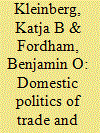

|
|
|
|
|
| Publication |
2013.
|
| Summary/Abstract |
Liberal international relations theory suggests that mutual gains from trade prevent conflict between states. Previous research has focused predominately on international outcomes, especially the occurrence of militarized conflict between pairs of states. How concerns about welfare gains from trade help produce the policy choices leading to these outcomes is less well understood. This paper examines the influence of economic interests arising from international trade on the policy-making process at the domestic level. If the benefits of trade increase the opportunity cost of conflict, then support for a harmonious foreign policy should be strongest among trade's domestic beneficiaries. Those whose income is diminished by trade have no reason to favor a friendly foreign policy and might even prefer a hostile alternative. We test whether the domestic distributional effects of trade affect support for hostile foreign policies toward China among representatives in the US Congress. An analysis of cosponsorship and roll-call voting suggests that the export orientation and import sensitivity of their districts influences members' positions on measures that criticize Chinese policies or treat the country as a security threat.
|
|
|
|
|
|
|
|
|
|
|
|
|
|
|
|
| 2 |
ID:
160774
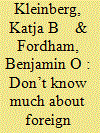

|
|
|
|
|
| Summary/Abstract |
Public opinion surveys on American foreign policy often elicit many “don’t know” or “no opinion” responses. Researchers have paid surprisingly little attention to these responses, typically dropping them from their analyses or suppressing them in the survey design. We argue that these practices lead to potentially misleading conclusions about both the level of support for particular foreign policies and the determinants of individual attitudes. We demonstrate these problems using an original survey experiment testing the effect of including a DKNO option on three common questions about international trade, the use of force, and isolationism. Our findings also suggest that taking DKNO responses more seriously in our analyses provides a richer sense of the process through which important covariates actually influence attitudes.
|
|
|
|
|
|
|
|
|
|
|
|
|
|
|
|
| 3 |
ID:
112460
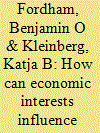

|
|
|
|
|
| Publication |
2012.
|
| Summary/Abstract |
Recent research on the sources of individual attitudes toward trade policy comes to very different conclusions about the role of economic self-interest. The skeptical view suggests that long-standing symbolic predispositions and sociotropic perceptions shape trade policy opinions more than one's own material well-being. We believe this conclusion is premature for two reasons. First, the practice of using one attitude to predict another raises questions about direction of causation that cannot be answered with the data at hand. This problem is most obvious when questions about the expected impact of trade are used to predict opinions about trade policy. Second, the understanding of self-interest employed in most studies of trade policy attitudes is unrealistically narrow. In reality, the close relationship between individual economic interests and the interests of the groups in which individuals are embedded creates indirect pathways through which one's position in the economy can shape individual trade policy preferences. We use the data employed by Mansfield and Mutz to support our argument that a more complete account of trade attitude formation is needed and that in such an account economic interests may yet play an important role.
|
|
|
|
|
|
|
|
|
|
|
|
|
|
|
|
| 4 |
ID:
106268
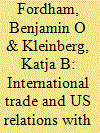

|
|
|
|
|
| Publication |
2011.
|
| Summary/Abstract |
US relations with China are critically important for the future of world politics. They are also a useful case in which to test the individual-level implications of the liberal commercial peace argument. A plausible case can be made on both sides of the claim that China poses a security threat to the United States. China's economy is growing far faster than the United States' economy, while the country remains a communist autocracy. At the same time, trade between the United States and China has expanded dramatically in the last three decades. Its dual role as a major trading partner and a growing international rival generates substantial uncertainty about China's future status as friend or foe. Using data from a recent survey by the Chicago Council on Foreign Relations, we find that economic interests help explain individual Americans' assessment of China as a threat and their views concerning hostile policies toward that country. Those who stand to benefit from trade with China hold more positive views of the country and oppose conflictual foreign policies with respect to it. Those whose incomes are likely to decline because of trade with China tend to take the opposite position on these questions.
|
|
|
|
|
|
|
|
|
|
|
|
|
|
|
|
| 5 |
ID:
146144
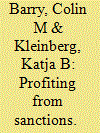

|
|
|
|
|
| Summary/Abstract |
Scholarship on the determinants of foreign direct investment (FDI) flows has produced valuable insights into the role of host state characteristics and home-host relations. This study draws attention to another factor in investment decisions—the political and economic relations that home and host states maintain with third-party states. More narrowly, we focus on how investors respond to their home-state's imposition of economic sanctions against a trading partner. Greater economic integration has allowed states to use economic sanctions more frequently in recent decades. At the same time, economic sanctions are thought to have a distorting effect on global trade and financial flows as firms and governments adjust to new constraints. We argue that as firms at home in the sanctioning state respond to coercive measures against a trading partner by looking for alternative sources of profit, they will shift investments to states that can provide indirect access to the sanctioned economy. In particular, those states that are perceived as prospective sanctions-busters—major trading partners of the sanctions target or states with a history of sanctions-busting behavior—will benefit disproportionately from the misfortune of others. We test this conjecture using data on US economic sanctions and global flows of US FDI from 1966 to 2000. The findings reveal that investor decision making in part responds to political developments beyond the home-host dyad.
|
|
|
|
|
|
|
|
|
|
|
|
|
|
|
|
| 6 |
ID:
117519
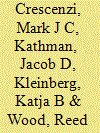

|
|
|
|
|
| Publication |
2012.
|
| Summary/Abstract |
In this paper, we examine how the past alliance behavior of nations affects the likelihood that these states will be involved in alliance formation. We contend that nations evaluate the reputations of potential allies when searching for alliance partners. Reputation information is processed by governments along with other immediate concerns. By introducing a model and developing subsequent measures of reputational alliance histories, we improve upon our current understanding of the factors that drive alliance formation. Using alliance reputation data derived from the ATOP project (1816-2000), we find support for the hypothesis that a reputation for upholding one's agreements significantly improves the likelihood of membership in future alliances.
|
|
|
|
|
|
|
|
|
|
|
|
|
|
|
|
| 7 |
ID:
175340
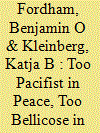

|
|
|
|
|
| Summary/Abstract |
Scholars of public opinion and foreign policy recognize that the general public is poorly informed about international affairs, but they disagree about whether and how this fact affects the policies that it will support. Some argue that the lack of information has little effect, at least in the aggregate, while others hold that political information mediates attention to elite cues. We investigate a third line of argument in which political information has a direct effect on the policy options individuals support. Low levels of political information give rise to a pattern of complacency toward likely international threats in times of relative peace and a contrasting tendency to support violent and aggressive policy options during war or acute crises. We test this argument using survey data from two relevant historical settings: the American entry into World War II and the response to the 9/11 terrorist attacks.
|
|
|
|
|
|
|
|
|
|
|
|
|
|
|
|
| 8 |
ID:
100283
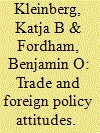

|
|
|
|
|
| Publication |
2010.
|
| Summary/Abstract |
Does trade influence whether individuals view other states as friendly or threatening? Liberal theory implies that it should, but the individual-level implications of the liberal argument are rarely tested. Trade should influence individual attitudes more strongly where trade is more economically important. International trade also creates both winners and losers within the trading states, and the foreign policy attitudes of these winners and losers should differ. The authors test hypotheses drawn from this line of argument using a forty-seven-country survey conducted by the Pew Global Attitudes project. They find some evidence that exports but not imports reduce hostile foreign policy attitudes. They find little support for the claim that the trade interests indicated by factor ownership influence attitudes toward trading partners in this broad cross-national sample. On the other hand, attitudes toward trade and foreign direct investment are correlated with broader foreign policy attitudes in the way liberal theory suggests. The authors conclude that there is reason to believe that trade influences individual foreign policy attitudes but that factor ownership does not provide an adequate account of individual interests in international trade in most cases.
|
|
|
|
|
|
|
|
|
|
|
|
|
|
|
|